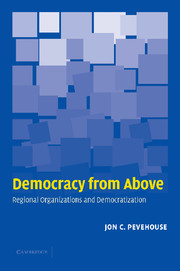Book contents
- Frontmatter
- Contents
- List of figures and tables
- Acknowledgments
- Abbreviations
- 1 Democratization and international relations
- 2 Regional organizations, the transition to and the consolidation of democracy
- 3 The supply-side of democratization and initial tests
- 4 Regional organizations and the transition to democracy
- 5 Regional organizations and the transition to democracy: evidence from cases
- 6 Regional organizations and democratic consolidation
- 7 Regional organizations and the consolidation of democracy: evidence from cases
- 8 Conclusion
- References
- Index
6 - Regional organizations and democratic consolidation
Published online by Cambridge University Press: 22 September 2009
- Frontmatter
- Contents
- List of figures and tables
- Acknowledgments
- Abbreviations
- 1 Democratization and international relations
- 2 Regional organizations, the transition to and the consolidation of democracy
- 3 The supply-side of democratization and initial tests
- 4 Regional organizations and the transition to democracy
- 5 Regional organizations and the transition to democracy: evidence from cases
- 6 Regional organizations and democratic consolidation
- 7 Regional organizations and the consolidation of democracy: evidence from cases
- 8 Conclusion
- References
- Index
Summary
The question of the survival of democracy has received less theoretical and empirical attention than transitions to democracy. This imbalance has begun to change, however, in reaction to the “third wave” of democratization. As these transitions reached their completion, both scholars and policymakers turned their attention to the next task: guaranteeing democracy's survival (Huntington 1991). In many cases, this would be a daunting task, including (re)building institutions grounded in democratic practices and (re)legitimizing democracy to the elites and the general public within the state. Most importantly, it means overcoming short-term opposition to new institutions by groups that could halt the reform process, or even return the state to authoritarian rule.
As with the literature on transitions, the empirical literature on democratic survivability has largely ignored the international context. Quantitative and qualitative investigations of regime consolidation routinely ignore international factors that could influence the longevity of democracy. Rather, these studies focus on issues of economic development (Haggard and Kaufman 1995b; Huntington 1991), economic performance (Gasiorowski and Power 1998; Przeworski and Limongi 1997), and institutional variations including political parties (Power and Gasiorowski 1997; Sartori 1976; Shugart and Carey 1992). Rather than supplanting these domestic factors, I contend that international variables such as regional organizations serve as a structural factor which can be used by domestic agents to cope with the challenges of cementing nascent democratic institutions.
This chapter tests the hypothesis that regional organizations can be used by domestic actors to increase democratic longevity.
- Type
- Chapter
- Information
- Democracy from AboveRegional Organizations and Democratization, pp. 154 - 168Publisher: Cambridge University PressPrint publication year: 2005



